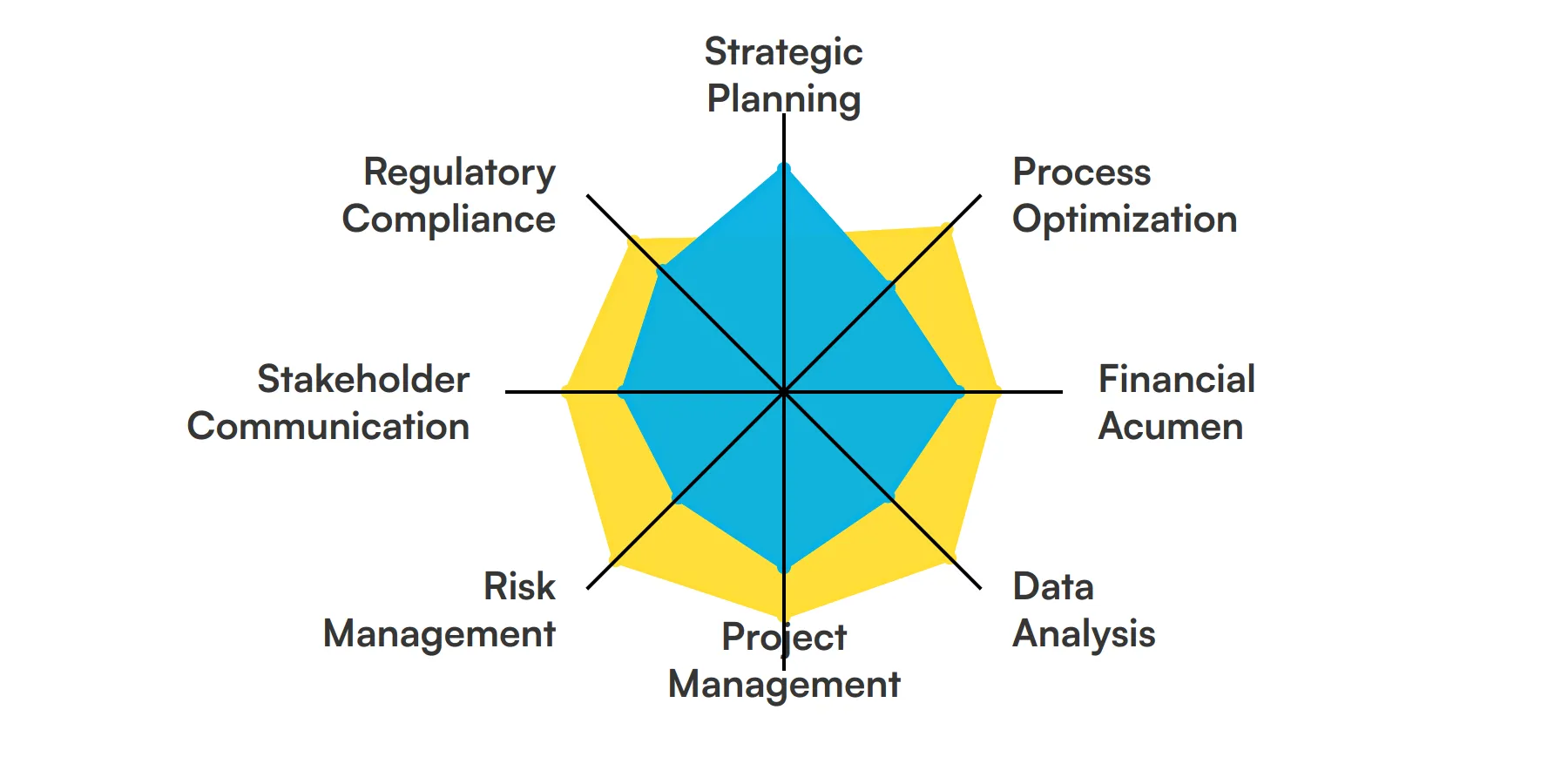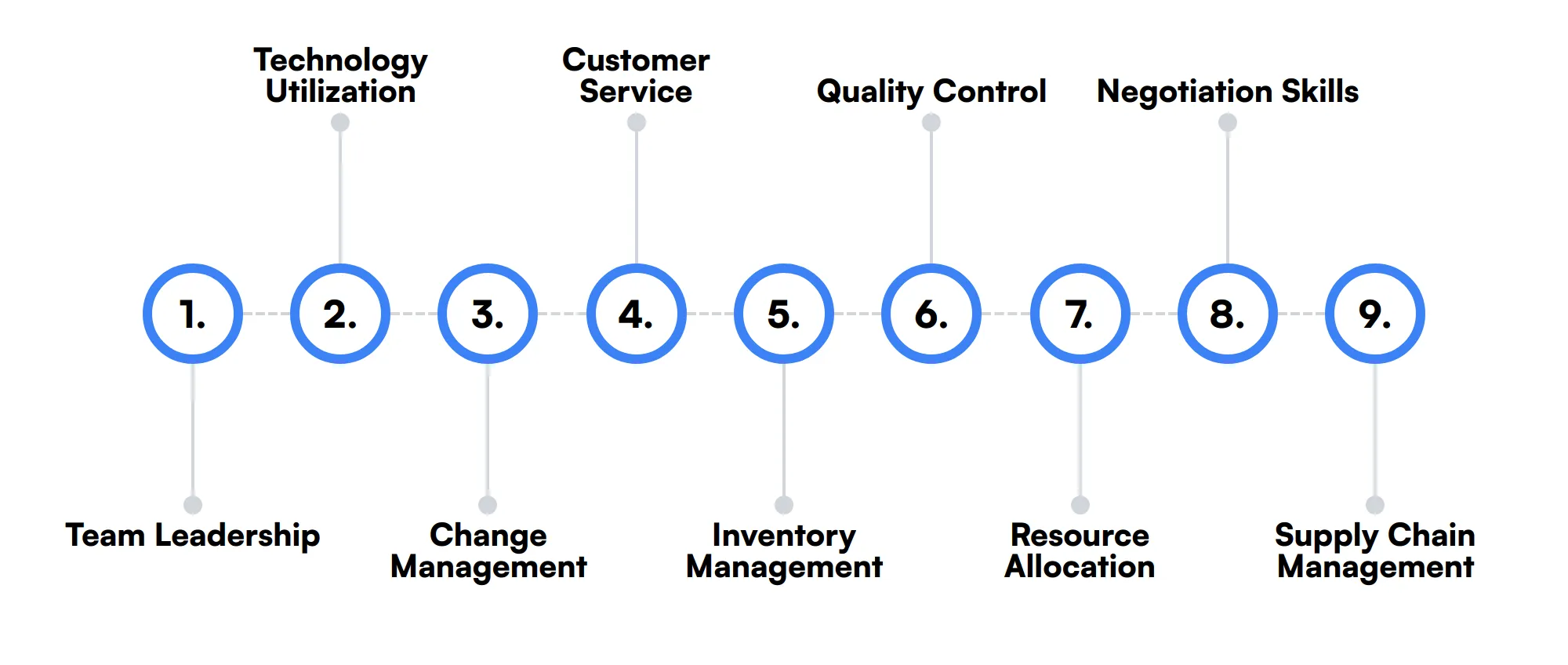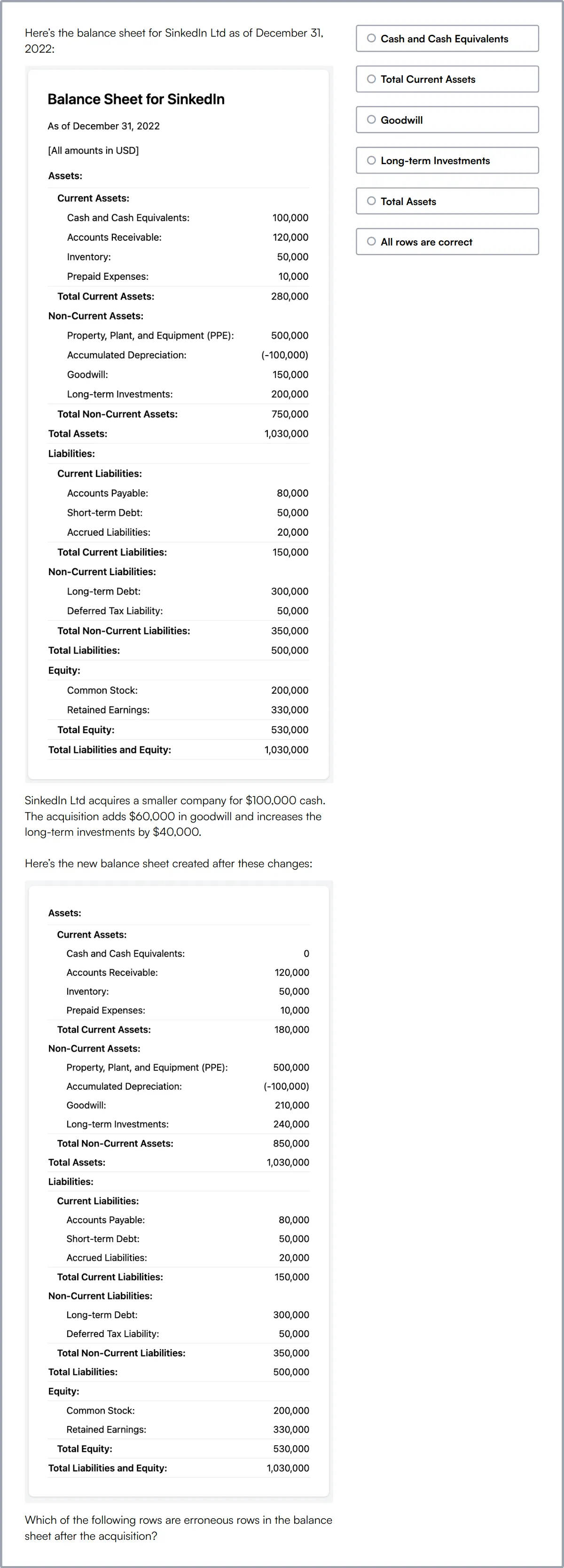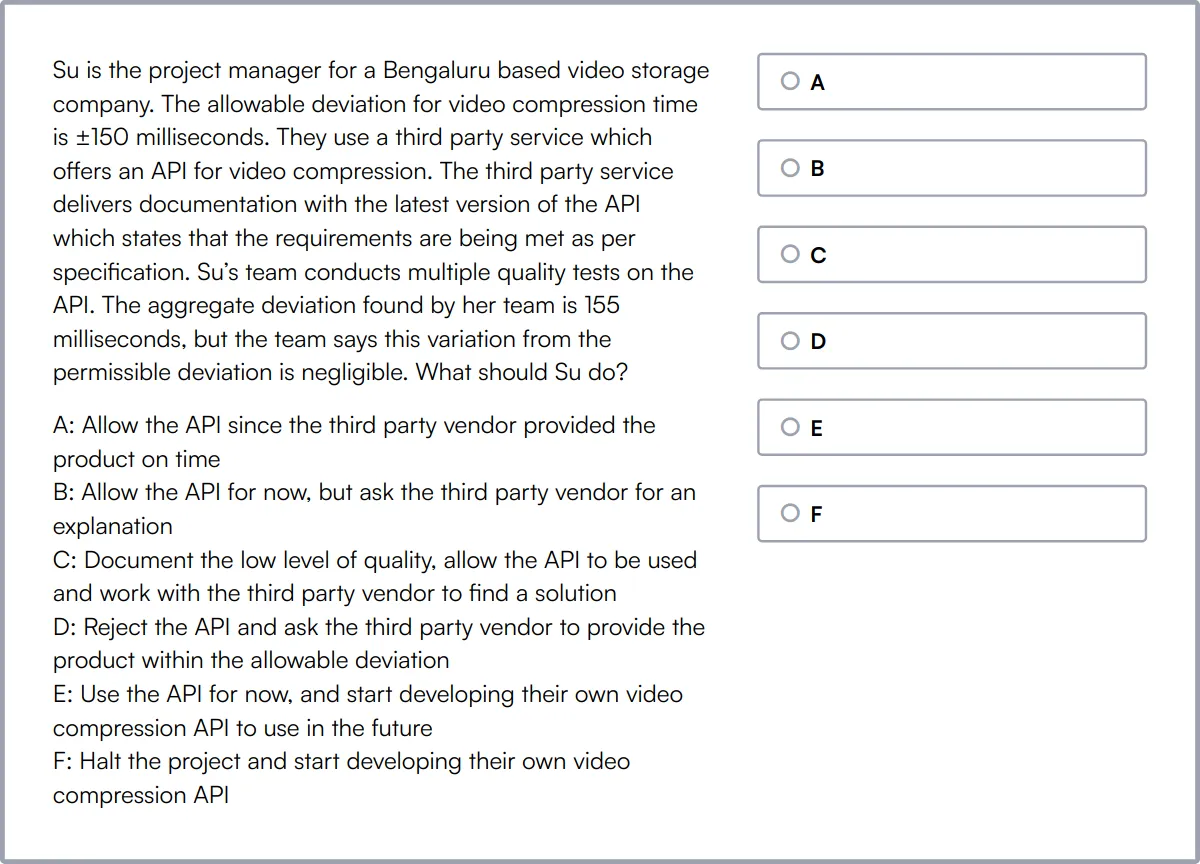A Business Operations Manager ensures that an organization's day-to-day activities run smoothly and efficiently. They oversee various departments, streamline processes, and work to improve overall productivity and profitability.
Skills required for a Business Operations Manager include strong leadership, strategic planning, and excellent communication. Additionally, they need to be adept at problem-solving and have a good understanding of financial management.
Candidates can write these abilities in their resumes, but you can’t verify them without on-the-job Business Operations Manager skill tests.
In this post, we will explore 8 essential Business Operations Manager skills, 9 secondary skills and how to assess them so you can make informed hiring decisions.
Table of contents
8 fundamental Business Operations Manager skills and traits
The best skills for Business Operations Managers include Strategic Planning, Process Optimization, Financial Acumen, Data Analysis, Project Management, Risk Management, Stakeholder Communication and Regulatory Compliance.
Let’s dive into the details by examining the 8 essential skills of a Business Operations Manager.

Strategic Planning
Strategic planning is key for a Business Operations Manager to ensure that all business functions are aligned with the company's overall objectives. This skill involves setting long-term goals and mapping out the necessary steps to achieve them, which is crucial for driving business growth and efficiency.
For more insights, check out our guide to writing a Business Operations Manager Job Description.
Process Optimization
A Business Operations Manager must excel in process optimization to enhance the efficiency of business operations. This involves analyzing existing processes, identifying inefficiencies, and implementing solutions that reduce waste and increase productivity.
Financial Acumen
Understanding financial metrics and managing budgets is essential for a Business Operations Manager. This skill ensures that the business can make informed decisions, maintain profitability, and achieve financial objectives.
Check out our guide for a comprehensive list of interview questions.
Data Analysis
Data analysis enables a Business Operations Manager to make evidence-based decisions. By interpreting complex data sets, they can identify trends, forecast outcomes, and measure the impact of operational changes.
Project Management
Effective project management is crucial for overseeing various initiatives within the company. A Business Operations Manager uses this skill to plan, execute, and finalize projects according to strict deadlines and within budget.
For more insights, check out our guide to writing a Project Manager Job Description.
Risk Management
Risk management involves identifying, assessing, and mitigating risks that could impact the business. A Business Operations Manager uses this skill to safeguard the company's assets and ensure business continuity.
Stakeholder Communication
Clear communication with stakeholders is essential for a Business Operations Manager to ensure all parties are aligned and informed. This skill helps in managing expectations and fostering strong relationships with partners, suppliers, and customers.
Regulatory Compliance
Ensuring compliance with laws and regulations is a critical responsibility for a Business Operations Manager. This skill helps to avoid legal issues and maintain the company's reputation by adhering to industry standards and practices.
9 secondary Business Operations Manager skills and traits
The best skills for Business Operations Managers include Team Leadership, Technology Utilization, Change Management, Customer Service, Inventory Management, Quality Control, Resource Allocation, Negotiation Skills and Supply Chain Management.
Let’s dive into the details by examining the 9 secondary skills of a Business Operations Manager.

Team Leadership
While overseeing various teams, a Business Operations Manager must be adept at motivating and guiding team members to achieve business goals.
Technology Utilization
Utilizing the right technology can streamline operations and increase productivity, making it a valuable skill for a Business Operations Manager.
Change Management
The ability to manage and adapt to organizational change is important for maintaining operational effectiveness in a dynamic business environment.
Customer Service
Understanding and enhancing the customer experience can lead to improved satisfaction and loyalty, which are important for business success.
Inventory Management
Proper inventory management ensures that a business has the right amount of products available to meet customer demand without surplus.
Quality Control
Maintaining high quality standards for products and services is crucial for sustaining the brand's reputation and customer trust.
Resource Allocation
Efficient allocation of resources ensures that every department or project has what it needs to succeed without overspending.
Negotiation Skills
Effective negotiation helps in securing favorable terms in contracts and agreements, which is beneficial for business operations.
Supply Chain Management
Managing the supply chain effectively ensures that the business can meet its production targets and fulfill customer orders efficiently.
How to assess Business Operations Manager skills and traits
Assessing the skills and traits of a Business Operations Manager can be a challenging task, given the diverse range of competencies required for the role. From strategic planning and process optimization to financial acumen and data analysis, a Business Operations Manager must wear many hats to ensure the smooth functioning of an organization.
Traditional resumes and interviews often fall short in providing a comprehensive view of a candidate's abilities. Skills-based assessments offer a more reliable way to evaluate a candidate's proficiency in key areas such as project management, risk management, and stakeholder communication. These assessments can help you determine whether a candidate has the practical skills needed to excel in your specific business environment.
To streamline the hiring process and improve the quality of hires, consider using Adaface assessments. These tests can help you achieve a 2x improved quality of hires and an 85% reduction in screening time. By focusing on real-world scenarios and practical skills, Adaface assessments provide a more accurate measure of a candidate's capabilities, ensuring you find the right fit for your team.
Let’s look at how to assess Business Operations Manager skills with these 6 talent assessments.
Business Analyst Test
Our Business Analyst Test evaluates a candidate's ability to identify and define business problems, gather and analyze requirements, create process models, and communicate effectively with stakeholders.
The test covers data analysis, requirements gathering, data visualization, critical thinking, problem-solving, and SQL fundamentals. Candidates are assessed on their ability to interpret data, develop use cases, and manage projects using agile methodologies.
Successful candidates demonstrate strong skills in SQL CRUD statements, data interpretation, and business analysis. They also show proficiency in critical thinking and problem-solving, essential for effective business operations management.

Product Marketing Management Test
Our Product Marketing Management Test evaluates a candidate's knowledge of product marketing strategies, market analysis, customer segmentation, branding, pricing, and product launch techniques.
The test assesses skills in marketing basics, digital marketing, SEO fundamentals, programmatic SEO, and communication skills. It also includes situational judgment questions to evaluate decision-making in real-world scenarios.
High-scoring candidates show proficiency in developing effective marketing plans and executing campaigns. They also demonstrate strong communication skills and the ability to analyze market trends and customer data.
Financial Accounting Online Test
Our Financial Accounting Test evaluates a candidate's knowledge and skills related to financial statements, accounting principles, budgeting, and financial analysis.
The test covers financial statements, double-entry bookkeeping, assets and liabilities, income and expense recognition, financial ratios, and cash flow statements. Candidates are assessed on their ability to interpret and analyze financial data and apply accounting standards.
Successful candidates demonstrate strong skills in financial analysis, inventory valuation, and depreciation and amortization. They also show proficiency in communicating financial information effectively to stakeholders.

Data Analysis Test
Our Data Analysis Test assesses a candidate's ability to handle, modify, analyze, and interpret data using various tools and techniques.
The test covers data modeling, data analysis, business analysis fundamentals, data interpretation, SQL, and data operations. Candidates are evaluated on their ability to extract meaningful insights, detect anomalies, and visualize data using charts and graphs.
High-scoring candidates demonstrate proficiency in data investigations, correlations, and ranking. They also show strong skills in using popular data tools like Excel for data analysis and visualization.

Project Management Test
Our Project Management Test assesses a candidate's ability to plan and execute projects from conception to implementation, manage resources, and deliver results.
The test covers cost and budget estimation, situational judgment, project planning, issue resolution, stakeholder management, and agile project management. Candidates are evaluated on their ability to prioritize tasks, assess risks, and manage project timelines.
Successful candidates demonstrate strong skills in resource management, risk analysis, and project reporting. They also show proficiency in both agile and traditional project management methodologies.

Hyperion Financial Management Test
Our Hyperion Financial Management Test evaluates a candidate's proficiency in using the Oracle Hyperion Financial Management tool for financial consolidation and reporting.
The test covers financial reporting, budgeting and forecasting, data integration, business rules, currency translation, and financial consolidation. Candidates are assessed on their ability to design and configure financial management applications and perform data analysis.
High-scoring candidates demonstrate strong skills in data management, intercompany transactions, and security and user management. They also show proficiency in creating and managing financial reports using Hyperion.
Summary: The 8 key Business Operations Manager skills and how to test for them
| Business Operations Manager skill | How to assess them |
|---|---|
| 1. Strategic Planning | Evaluate ability to develop long-term objectives and identify growth opportunities. |
| 2. Process Optimization | Assess skills in streamlining operations to enhance productivity and efficiency. |
| 3. Financial Acumen | Test understanding of financial metrics and their impact on business decisions. |
| 4. Data Analysis | Check proficiency in interpreting complex data to drive business insights. |
| 5. Project Management | Review experience in managing timelines, resources, and project deliverables. |
| 6. Risk Management | Analyze capability to identify, evaluate, and mitigate potential risks. |
| 7. Stakeholder Communication | Observe effectiveness in communicating with and aligning diverse stakeholders. |
| 8. Regulatory Compliance | Verify knowledge of relevant laws and ability to maintain compliance. |
Business Analyst Excel Test
Business Operations Manager skills FAQs
What is the importance of strategic planning in a Business Operations Manager role?
Strategic planning helps align the company's goals with its operational capabilities. It ensures that resources are allocated effectively to meet long-term objectives.
How can recruiters assess a candidate's process optimization skills?
Recruiters can ask candidates to describe past projects where they improved efficiency. Look for specific metrics or outcomes that demonstrate their impact.
Why is financial acumen important for a Business Operations Manager?
Financial acumen allows managers to make informed decisions about budgeting, forecasting, and resource allocation, directly impacting the company's profitability.
What are some key indicators of strong data analysis skills?
Candidates should be able to interpret data trends, use analytical tools, and provide actionable insights. Look for experience with software like Excel, SQL, or Tableau.
How do you evaluate a candidate's project management abilities?
Ask about their experience with project management methodologies like Agile or Scrum. Look for examples of successful project completions and how they managed timelines and resources.
What role does stakeholder communication play in business operations?
Effective communication ensures that all stakeholders are aligned and informed, which is crucial for smooth operations and successful project outcomes.
How can you assess a candidate's risk management skills?
Inquire about their experience with identifying, assessing, and mitigating risks. Look for examples where they successfully navigated potential issues.
What are the benefits of technology utilization in business operations?
Technology can streamline processes, improve data accuracy, and enhance productivity. Candidates should be familiar with relevant software and tools.

40 min skill tests.
No trick questions.
Accurate shortlisting.
We make it easy for you to find the best candidates in your pipeline with a 40 min skills test.
Try for freeRelated posts
Free resources



